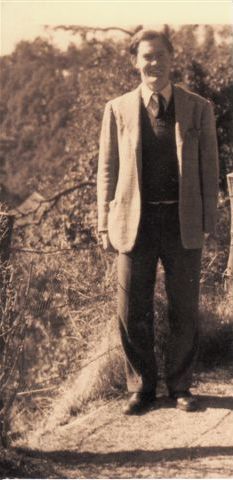Wavell, Archibald John Arthur
- Date of birth:
- 1916
- Date of death:
- December 24th, 1953 (Thiki-Nairobi, Kenya)
- Nationality:
- British
Biography
Archibald John Arthur Wavell was the son of Field Marshall The Rt. Hon. Archibald Percival Wavell.
He lost his left hand during the fightings against the Japanese in Burma. The photo has been taken at Simla, India in 1946.
Major Wavell was killed in action, fighting the Mau Mau near Thiki, north of Nairobi on the 24th December 1953 whilst leading a patrol of the Black Watch.
Service number: 67159.
Do you have more information about this person? Inform us!
- Period:
- Second World War (1939-1945)
- Rank:
- Captain
- Unit:
- The Black Watch, Royal Highland Regiment, 77th Indian Infantry Brigade, Indian Army
- Awarded on:
- January 23rd, 1947
The South Staffords had been given the task of clearing north of the river, but after some heavy fighting they had been driven back from the final Japanese position on the river which Capt Wavell's Coy had assaulted.
Capt Wavell had recently been flown in as a reinforcement and took command of the Coy after the Coy Commander had been killed a few days before.
At about 16.30 hrs I went to see the Bn Comdr to find out the situation, as, if we had not consolidated, our leading elements would be in a precarious position for the night and it might be neccessary to withdraw thm. Capt Wavell was reporting to the Bn Comdr, Lt Col Degg, and was asking if he could put in another attack, as, in his previous attack, he thought he had located all the Jap positions.
Although it was a stiff task, and although Lt Col Degg was wary of giving this task to Capt Wavell's Coy, already weakened by casualties during his previous attack, I gave Capt Wavell leave to attack, as otherwise I would have had to withdraw part of the Bde.
Capt Wavell led his Coy into the attack with great elan and gallantry and, after a stiff hand to hand fight against equal numbers he took a position killing about 25 Japs and driving out 40 more. Although severely wounded in the wrist, Capt Wavell, in the absence of the other two officers of his Coy who had been killed in the attack, consolidated the position, laying out an adequate defensive position, his flank on the river. His Coy had suffered a further 20 casualties. Only after he had done this and after he had reported personally to Lt Col Degg did he report to the Bn RAP. His bandaged hand was only hanging on by 1/2 inch of bone and gristle and this prevented the flow of bood by an improvised tourniquet. His hand had to be amputated that night. Later he showed a fine example to the men in refusing to be evacuated by light plane, before more seriously wounded men, although the plane was sent in to get him out, as it was feared that in the precarious position on paper in which the Bde appeared to be, it could not be risked that he fell prisoner into the Jap or INA hands and held hostage.
Capt Wavell's gallantry, determination to win, careless of his own life, his fortitude and devotion to duty after being seriously wounded was an outstanding example to all ranks and worthy of the great name he bears."
Sources
- Photo 1: Roger Broady
- - Supplement to the London Gazette of Tuesday 21st January 1945, issue 37861 dd. 23rd January 1947



